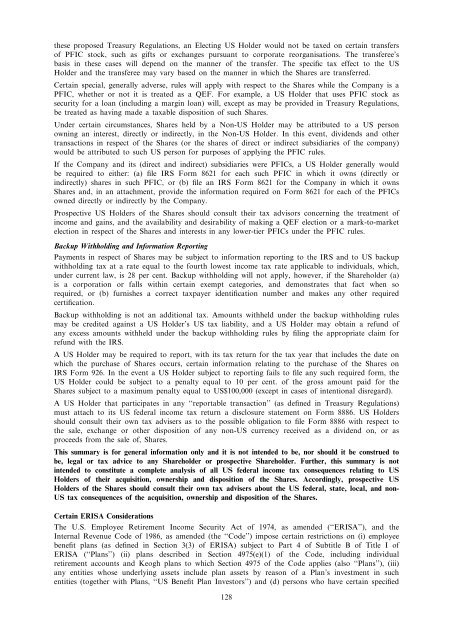You also want an ePaper? Increase the reach of your titles
YUMPU automatically turns print PDFs into web optimized ePapers that Google loves.
these proposed Treasury Regulations, an Electing US Holder would not be taxed on certain transfers<br />
of PFIC stock, such as gifts or exchanges pursuant to corporate reorganisations. The transferee’s<br />
basis in these cases will depend on the manner of the transfer. The specific tax effect to the US<br />
Holder and the transferee may vary based on the manner in which the Shares are transferred.<br />
Certain special, generally adverse, rules will apply with respect to the Shares while the Company is a<br />
PFIC, whether or not it is treated as a QEF. For example, a US Holder that uses PFIC stock as<br />
security for a loan (including a margin loan) will, except as may be provided in Treasury Regulations,<br />
be treated as having made a taxable disposition of such Shares.<br />
Under certain circumstances, Shares held by a Non-US Holder may be attributed to a US person<br />
owning an interest, directly or indirectly, in the Non-US Holder. In this event, dividends and other<br />
transactions in respect of the Shares (or the shares of direct or indirect subsidiaries of the company)<br />
would be attributed to such US person for purposes of applying the PFIC rules.<br />
If the Company and its (direct and indirect) subsidiaries were PFICs, a US Holder generally would<br />
be required to either: (a) file IRS Form 8621 for each such PFIC in which it owns (directly or<br />
indirectly) shares in such PFIC, or (b) file an IRS Form 8621 for the Company in which it owns<br />
Shares and, in an attachment, provide the information required on Form 8621 for each of the PFICs<br />
owned directly or indirectly by the Company.<br />
Prospective US Holders of the Shares should consult their tax advisors concerning the treatment of<br />
income and gains, and the availability and desirability of making a QEF election or a mark-to-market<br />
election in respect of the Shares and interests in any lower-tier PFICs under the PFIC rules.<br />
Backup Withholding and Information Reporting<br />
Payments in respect of Shares may be subject to information reporting to the IRS and to US backup<br />
withholding tax at a rate equal to the fourth lowest income tax rate applicable to individuals, which,<br />
under current law, is 28 per cent. Backup withholding will not apply, however, if the Shareholder (a)<br />
is a corporation or falls within certain exempt categories, and demonstrates that fact when so<br />
required, or (b) furnishes a correct taxpayer identification number and makes any other required<br />
certification.<br />
Backup withholding is not an additional tax. Amounts withheld under the backup withholding rules<br />
may be credited against a US Holder’s US tax liability, and a US Holder may obtain a refund of<br />
any excess amounts withheld under the backup withholding rules by filing the appropriate claim for<br />
refund with the IRS.<br />
A US Holder may be required to report, with its tax return for the tax year that includes the date on<br />
which the purchase of Shares occurs, certain information relating to the purchase of the Shares on<br />
IRS Form 926. In the event a US Holder subject to reporting fails to file any such required form, the<br />
US Holder could be subject to a penalty equal to 10 per cent. of the gross amount paid for the<br />
Shares subject to a maximum penalty equal to US$100,000 (except in cases of intentional disregard).<br />
A US Holder that participates in any ‘‘reportable transaction’’ (as defined in Treasury Regulations)<br />
must attach to its US federal income tax return a disclosure statement on Form 8886. US Holders<br />
should consult their own tax advisers as to the possible obligation to file Form 8886 with respect to<br />
the sale, exchange or other disposition of any non-US currency received as a dividend on, or as<br />
proceeds from the sale of, Shares.<br />
This summary is for general information only and it is not intended to be, nor should it be construed to<br />
be, legal or tax advice to any Shareholder or prospective Shareholder. Further, this summary is not<br />
intended to constitute a complete analysis of all US federal income tax consequences relating to US<br />
Holders of their acquisition, ownership and disposition of the Shares. Accordingly, prospective US<br />
Holders of the Shares should consult their own tax advisers about the US federal, state, local, and non-<br />
US tax consequences of the acquisition, ownership and disposition of the Shares.<br />
Certain ERISA Considerations<br />
The U.S. Employee Retirement Income Security Act of 1974, as amended (‘‘ERISA’’), and the<br />
Internal Revenue Code of 1986, as amended (the ‘‘Code’’) impose certain restrictions on (i) employee<br />
benefit plans (as defined in Section 3(3) of ERISA) subject to Part 4 of Subtitle B of Title I of<br />
ERISA (‘‘Plans’’) (ii) plans described in Section 4975(e)(1) of the Code, including individual<br />
retirement accounts and Keogh plans to which Section 4975 of the Code applies (also ‘‘Plans’’), (iii)<br />
any entities whose underlying assets include plan assets by reason of a Plan’s investment in such<br />
entities (together with Plans, ‘‘US Benefit Plan Investors’’) and (d) persons who have certain specified<br />
128


